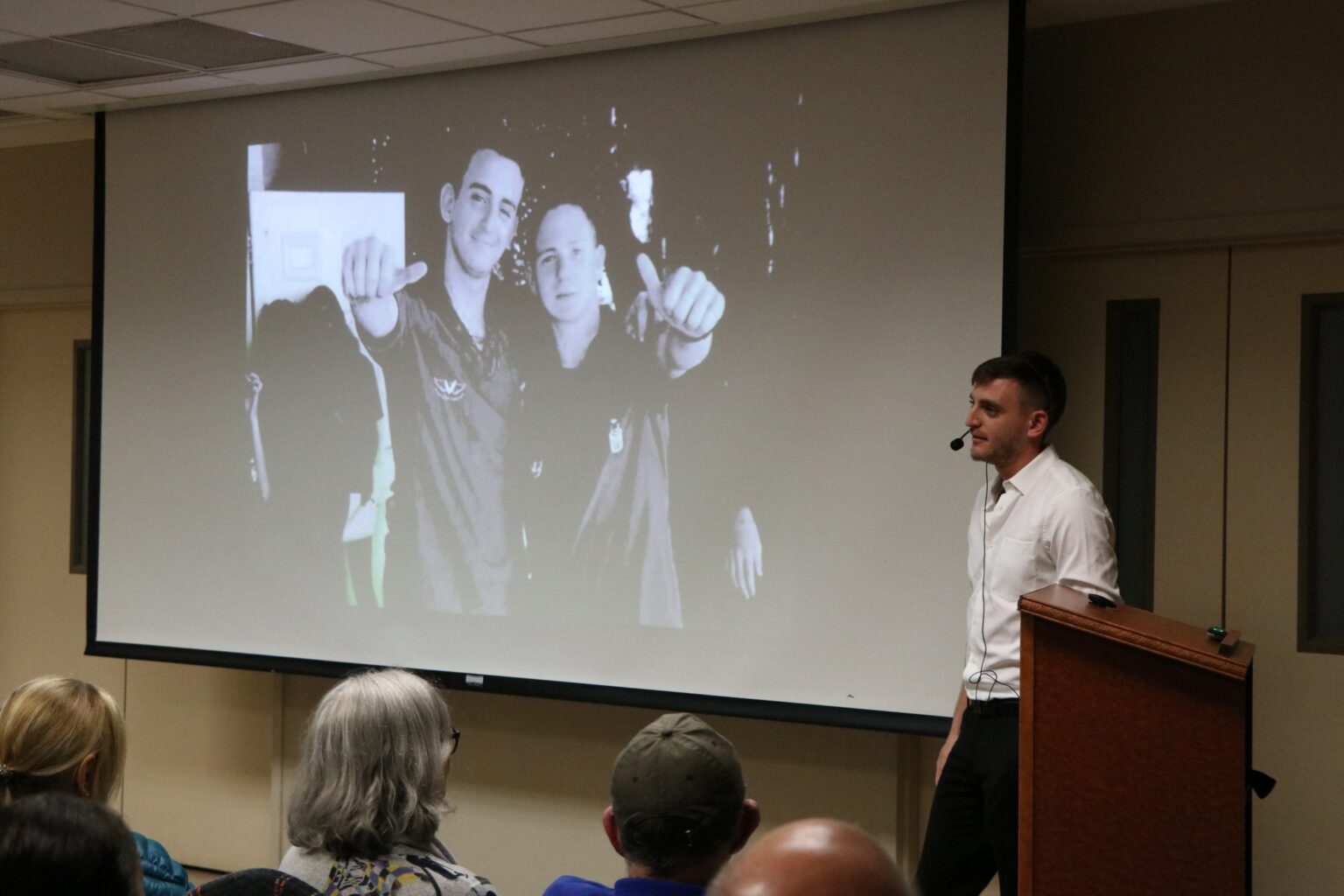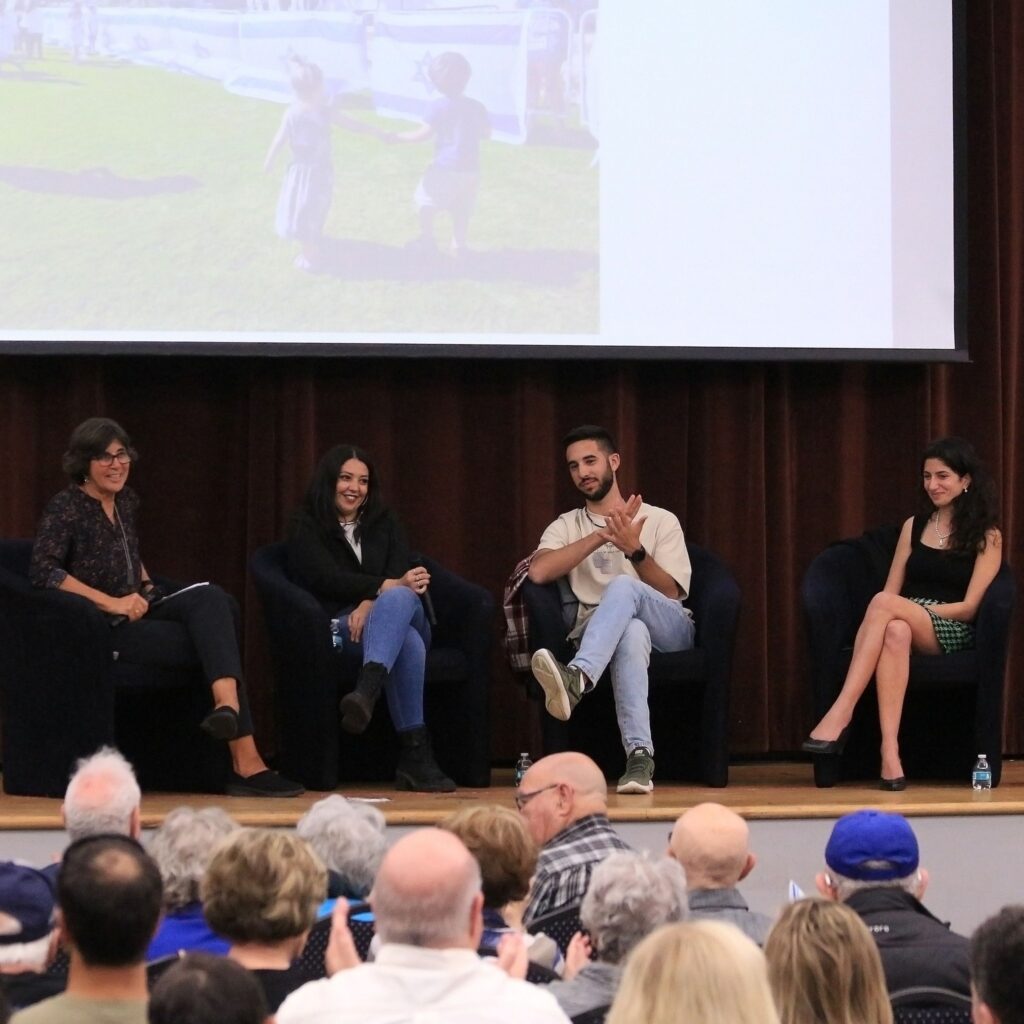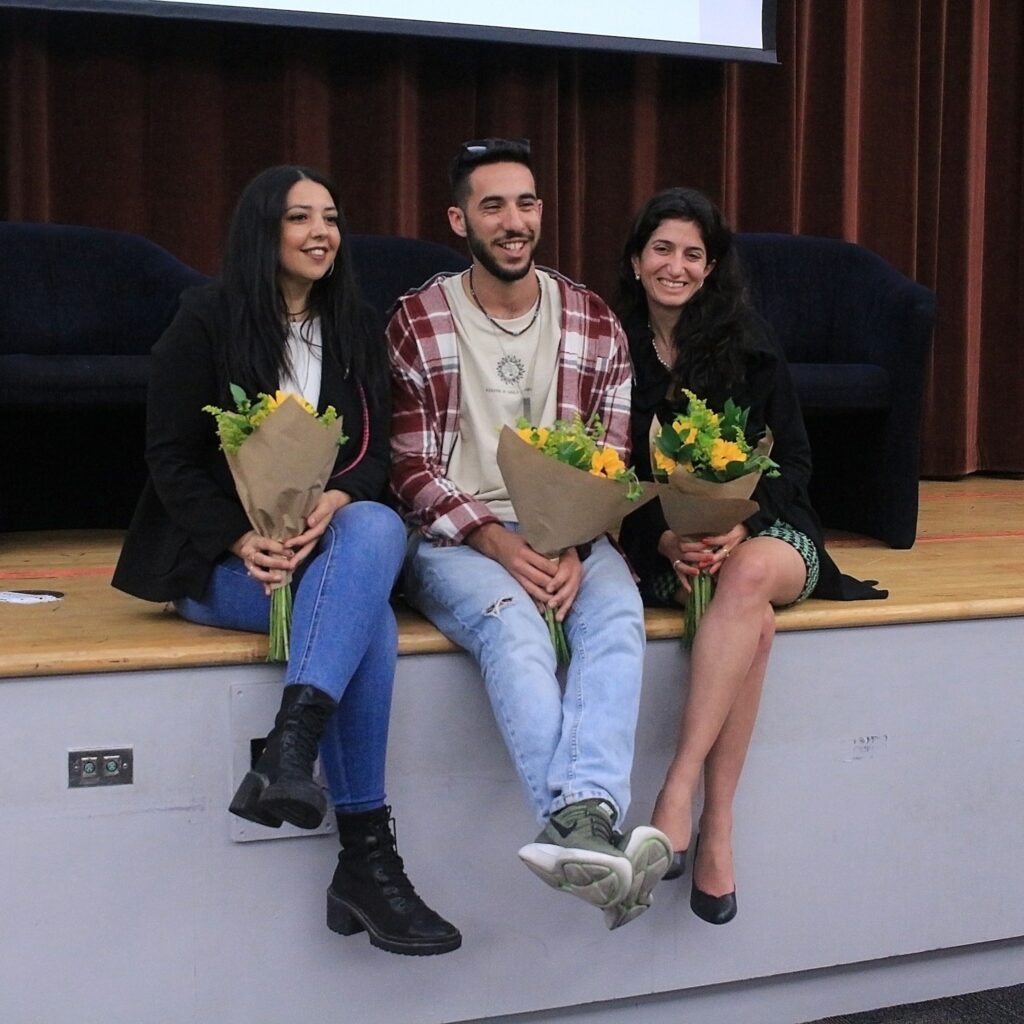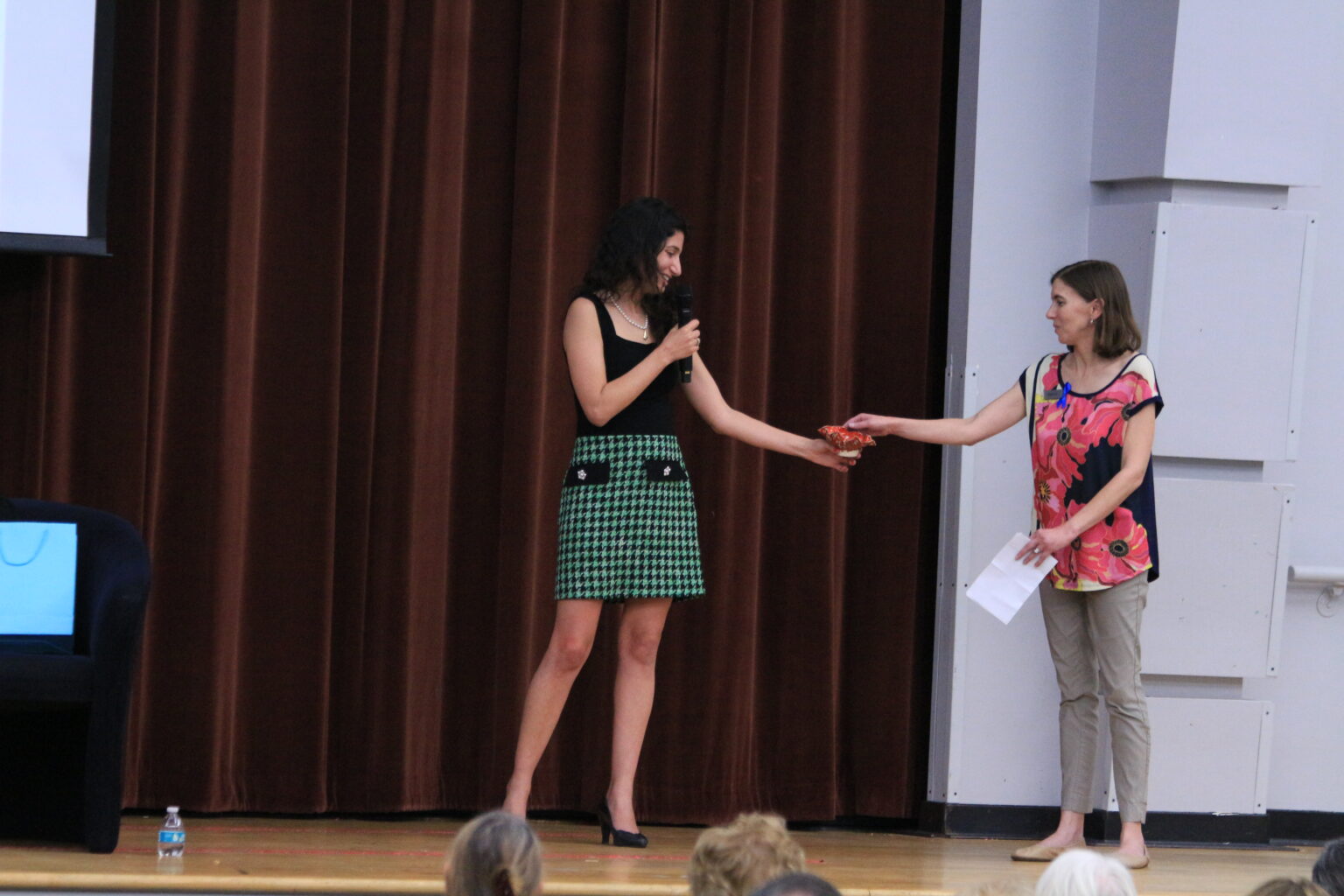Stories of Resilience from Heroes and Heroines in Israel
Life around the world and throughout our Jacksonville community changed after October 7. Waiting to learn whether family, friends, colleagues, and neighbors in Israel were safe, accounted for, and had protection plans in place for the days ahead, we shed tears, prayed for hostages, and embraced as the Iron Swords War began. We read news stories, saw images, watched videos of devastation, and still today we continue to wait to learn if 130 hostages are alive or will ever return home.
With a mission to educate and dispel any misinformation from the Oct 7 attacks and the ongoing war, groups from Israel traveled to share their stories of resilience with communities throughout North America. Our Jewish Community Alliance hosted two of these events, hearing from four Israelis who shared poignant and bone-chilling accounts of the unimaginable events they experienced on Oct 7.

Yarin Levin with Faces of October Seventh (facesofOct7.com), spoke at the JCA in November 2023 to share his firsthand testimony about escaping the Nova festival in the western Negev desert while leading hundreds of concertgoers to safety.
A former Israeli Defense Forces officer, Yarin said he was not initially alarmed when standing outside of the entrance to the festival and seeing missiles headed in the direction of the concert. Then, when Hamas ascended on the crowd with gunfire, Yarin said he immediately shouted, “terrorists” while concertgoers began running to find safety.
With his close friends and hundreds of others following on foot, Yarin described seeing horrors that developed as he escaped the attacks. He recanted women who were mutilated, people shot in the head and run over by SUVs, and he wondered whether a man survived after Yarin gave him his belt to use as a tourniquet. While sharing his story, Yarin paused and apologized to our audience for how difficult it was to retell the events, but how important he felt it was to share his testimony.
After miles of traveling, and approximately 10 hours of running for his life, Yarin finally made it home from the festival. Strengthening our connection to Israel and the events that remain at the forefront of our minds, Yarin’s testimony was emotional, candid, and a vivid reminder of those who continue to suffer from the loss of their loved ones at the hands of terrorists.
Yali Jacobovitz, Sapir Sa’ar, and Gat Gonen, each with separate, devastating accounts of living through Oct 7, spent 24 hours in our community thanks to the JCC Association of North America in partnership with Israel’s Ministry for Diaspora Affairs and Combating Antisemitism and The World Zionist Organization.

In two gatherings this April, one held at River Garden Senior Services and the second at the JCA, moderator Janet Goldstein with the Jewish Federation & Foundation of Northeast Florida’s Israel & Overseas Committee, began by asking Yali, Sapir, and Gat, what their lives were like in Israel before Oct 7. Then, our visitors shared the horrors they endured and continue to live since the war began.
Yali Jacobovitz grew up with his entire family in Kibbutz Nitzanim, north of the Gaza Strip and served as a combat soldier with the IDF. As he explained, the 23-year-old finished his military service, went on holiday with his best friend, and returned home to see his family one week before Oct 7.
Staying at his friend’s house in Zikim, a community near the Mediterranean Sea, four miles north of Gaza, Yali heard the Hamas infiltration at the kibbutz on Oct 7. Knowing something terrible was happening, Yali and his friend immediately left the house and joined the Kibbutz emergency squad in battle.
At the same time, Yali explained that he was receiving phone calls from his former IDF soldiers who were also fighting terrorists and working to keep people safe at different bases and kibbutzim throughout Israel. On the phone, Yali helped his soldiers, sharing information about what he was experiencing and advising them on what actions they should take.
In assisting the emergency squad, Yali and his friend kept hundreds of people in Zikim safe from the Hamas terrorists. Soon after, Yali got in his car and made the 30-minute drive to Re’im to meet his soldiers and help them into the evening when he was officially called back to the IDF for reserved duty.

An event planner and organizer, Sapir Sa’ar described herself as full of life, always having fun with her friends, listening to music, dancing, and having a love of driving the open road. Sapir laughed when she explained her hobbies to our audience at the JCA, “I am always driving, wherever we go – I drive. I am like the professional driver of my group of friends.”
On Oct 6, Sapir says she almost didn’t drive to be with her friends at the Nova Festival but decided to go at the last minute. As the terrorist attack on festivalgoers began, Sapir managed to get to her car, gather some of her friends and said she started driving out of the Negev desert as fast as she could. At one point when a line of traffic was blocking the way out, Sapir followed her instincts and decided to turn away from the traffic. Later the group found out that nearly every person sitting in the line of cars going in the opposite direction was brutally murdered at the hands of terrorists. After hours of offroad traveling to escape and following her instincts to choose which direction to go, Sapir and her friends found refuge, hiding in Be’er Sheva about 25 miles from the Nova Festival site. Sapir said many of her friends were killed at the Nova Festival and as she attempts to heal from the horrors she witnessed and experienced on Oct 7, she hopes someday she will find joy again.
“Heaven,” is how Gat Gonen described her life in Ein Habesor, a moshav or village, where her entire family lived, where anemone flowers bloomed, and the land was lush with vegetation. Just outside of her village is Kibbutz Nir Oz, three miles from the Gaza Strip. Nir Oz, where Gat’s 2-year-old son went to preschool and where her friends and son’s teachers lived was a large part of the heaven Gat described. As Gat began her story, she told our audience that living so close to Gaza, hearing missiles, and running to her safe room was normal. On Oct 7, at 6:30 am, Gat said the attack was different, like massive firings she had never heard before. Within a few minutes, Gat and her husband knew that whatever was happening was going to be, “worse than ever.”

Gat’s husband quickly took his gun and ran outside while Gat took her son and locked themselves in their shelter. At that point, Gat said she received messages from her friends who told her that her husband was among men in the village fighting 30-40 Hamas terrorists. In parallel to this, Gat also received messages from Nir Oz, that terrorists had invaded the kibbutz and were trying to break into the shelters where people were hiding. Soon, Gat said she started sending messages to every parent she knew in Nir Oz, many of whom she later found out were kidnapped to Gaza or killed. On Oct 8, Gat said the village made the decision to leave their homes and were allowed one hour to pack one suitcase before fleeing. As of Gat’s visit to Jacksonville, she and the Ein Habesor community had broken apart as families worked to try to rebuild their lives since the attacks on Oct 7. Understandably feeling the unrest of not being able to return home, Gat said she remains hopeful that one day she will sleep in her bed and be in her thriving village once again.

At the end of the evening with our visitors from Israel, Gat asked our J Institute Assistant Director and Jewish Educator Rachel Sandler to join her on stage of the Bessie Setzer Frisch Auditorium. Presenting Rachel with a glass anemone as a thank you for hosting, Gat explained that anemones have special meaning for residents who live in the Gaza Envelope. A symbol of life and overcoming hardship, anemones are associated with the popular Darom Adom, Red South Festival in northern Negev. On Oct 7, the protected anemone fields in the Gaza Envelope turned into fields of blood during the Hamas terrorist attack. The glass anemone gifted to our JCA, made by Neta Geva, is part of The Anemone Project, a symbol of hope and renewal that commemorates the loved ones who were murdered on Oct 7. Hundreds of ceramicists from Israel are working for The Anemone Project which aims to bring 100,000 flowers to locations around the world. We are honored to have this beautiful art and momentous gift from Israel.


